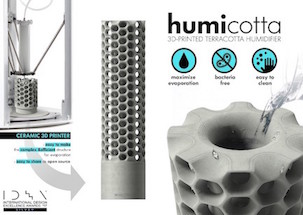Professor Sang-Min Bae’s team from the Department of Industrial Design has won a total of four awards, including one silver prize, at the 2017 International Design Excellence Awards (IDEA) hosted by the Industrial Designers Society of America (IDSA). Along with Germany’s Red Dot Design Awards and the iF Design Awards, IDEA is considered to be one of the world’s three most prestigious design competitions. Winning IDEA designs are chosen from 20 categories based on five criteria: design innovation, user experience, benefit to the client, benefit to society, and appropriate aesthetics.
Humicotta — the silver prize winner

Professor Bae’s silver prize winner in the home and bath category, Humicotta, is a 3D-printed ceramic humidifier composed of a base module and a filter. Bacteria-free, easy to clean, and energy-efficient, it provides a semi-permanent solution to the issues of all types of conventional humidifiers.
The humidifier’s mechanism of action is simple; the user pours water into the container inside the filter, and the small built-in fan in the base module creates airflow to accelerate natural evaporation and subsequent humidification. The 3D-printed terracotta filter further acts to aid the maximization of evaporation rate, with its honeycomb structure inspired by the natural form and hyper-porous nature of the diatomite material. With such reliance on natural mechanisms, the system requires eight times less energy than a regular electric humidifier. Furthermore, the assembly of the modules and washing of the filter can be done in a single, simple step, reducing the workload on the part of users.
Humicotta has an open platform service that allows users to customize their filter design to their own aesthetic likings, giving the product the possibility of becoming part of home interior design. The customized designs can also be shared and downloaded on the platform. “We have disclosed all of Humicotta’s data so that anyone with access to a 3D printer can design their own humidifier. This is a design that can cooperate with the public,” said Professor Bae.
First aid kit in a cone
The second award winner, S.CONE, is a first aid kit platform developed in partnership with Samsung Fire & Marine Insurance. Its most distinguishing feature is its distinctive traffic cone shape, by which people can easily recognize and immediately access the kit in emergency situations. There are three variations of S.CONE, each of which contains unique items to protect users from the particular situation: for FIRE, for CAR, and for MARITIME. For instance, S.CONE for FIRE includes a fire extinguisher, an anti-smoke mask, and a fire blanket. The cap of the cone can also function as a detector and IoT station that alerts users through their smartphones in case of a safety accident.
Appropriate technology for the Maasai
A major focus of the team’s research is philanthropy design to address several social issues across the globe. The team is running what it calls the “seed project”, a project to design appropriate technology for third-world countries. Every year, team members visit developing areas to tend to crucial, local needs with their designs. The remaining two of the team’s four 2017 IDEA winners are part of this project, designed specifically for the Maasai tribe in Africa.
The first, the Light Funnel, is a daylighting device for the windowless Maasai soil houses in off-grid Africa. As a result, the insides of the houses are extremely dark even during the day, making indoor activity difficult for inhabitants. The Light Funnel allows for the maximization of the natural light effect in the houses while only minimally disrupting the original structure. The funnel consists of a water-filled acrylic sphere and a screw-shaped reflective pathway. Sunlight passes through the funnel and into the house, the rays gathered by water in the sphere and converged in the transfer pipe. The result is a well-lighted environment, nine times brighter than it is without the funnel.
The Maasai Smart Cane is a smart cane for the elderly, made by assembling a Smart Grip unit with a fair trade wood stick from the Maasai tribe. The Smart Grip unit has an SOS button for the user to press when in an emergency situation. Information about the user’s location will be sent to emergency services so that immediate help can be sent. The intention of the design is to benefit both the Maasai and the elderly in developed countries; the Maasai can benefit economically by selling their handcrafted sticks, while the users can enjoy a more active and safe daily life.

